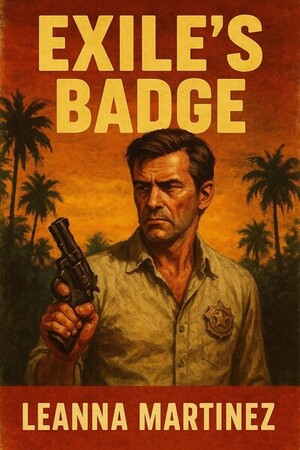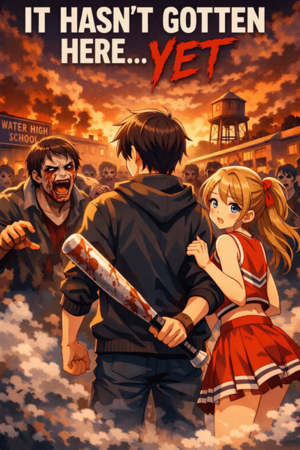Chapter 13:
Black Ops
Exile's Badge
The envelope sat on the table like a silent dare. Thick paper, corners creased, its weight out of proportion to its size. Sam had turned it over half a dozen times already, thumb tracing the seam, though he hadn’t opened it since Doyle left it behind. He didn’t need to. He remembered exactly what was inside: cash, an unmarked phone, and a slip of paper with an address scrawled in block letters.
Beside it lay the revolver, the same weapon he’d carried through years of late shifts and stakeouts, now gleaming dully in the low light. The sight of it stirred something old, something dangerous. He thought about leaving both the gun and the envelope where they sat and walking down to the cantina to let tequila drown the decision for him. He thought about catching a fishing boat north, vanishing into another town, starting the cycle again.
But he couldn’t.
He sat back on the bed, hands resting on his knees, staring at the pair of objects as though they might speak first. In his head, Maggie’s voice whispered about choices, about the kind of man he used to be. He pushed it away, the way he always did, but the ache lingered.
This wasn’t about Caruso, he told himself. Not anymore. That road had ended in San Francisco, in ashes and ghosts. This was about survival, about keeping his hands busy and his mind from turning to rot. He couldn’t drink forever, couldn’t sit in silence until the sea swallowed him. If Doyle’s offer gave him a reason to breathe one more day, maybe that was enough.
He slid the revolver back into its holster and pocketed the envelope.
* * *
The safehouse sat on the edge of La Paz, a concrete box half-hidden behind a row of shuttered storefronts. A single bulb over the door buzzed with insects, casting a weak circle of light onto the dust. Sam stepped inside to the smell of sweat, gun oil, and instant coffee.
Doyle was already there, jacket off, tie loosened. He looked as calm as if he’d been waiting in a hotel lobby.
“You came,” Doyle said, not quite a smile, not quite surprise.
Sam grunted. “You said there’d be work.”
“There is.” Doyle gestured to the back room. “Come meet the team.”
They were young, sharp suits traded for cargo pants and ball caps, pistols on their hips, energy vibrating off them like static. Sam recognized the type instantly: operators who’d cut their teeth in clean training grounds, eager to prove themselves in real dirt. They sized him up as he walked in, the lines on his face, the gray streaking his beard.
One of them, tall and broad-shouldered, muttered something under his breath. Another smirked.
Sam ignored them. He’d seen that look before, half curiosity, half dismissal. To them, he was baggage. Useful maybe, but compromised.
“This is Holden,” Doyle said, his tone smoothing the edges. “He’s not here to play soldier. He’s here because he knows the docks better than anyone else alive. He’s walked those lanes. He’s seen how the money moves, how the men talk. You want to understand Caruso’s network? You’ll listen when he tells you what matters.”
The smirk faded from one face, though not the others.
Sam stood with his hands loose at his sides, letting the silence stretch. He didn’t need to sell himself, not anymore. Either they’d see what he could do, or they wouldn’t.
Doyle clapped him lightly on the shoulder. “Think of him as a consultant. Different toolkit, same fight.”
Sam didn’t flinch under the contact, but his eyes stayed on the young men in the room. They were clean-cut, sharp-edged, and far too certain of themselves. He remembered being that certain once. It didn’t last.
He dropped into a chair in the corner, the revolver pressing against his side, the envelope heavy in his pocket. He didn’t belong here. Not with them. Not with Doyle. But belonging wasn’t the point.
He was here because he couldn’t sit in that room above the cantina any longer, staring at the gun and the bottle, waiting for the tide to make his decision for him.
If the work kept him moving, if it kept the ghosts at bay for a few more nights, then maybe that was enough.
* * *
The first job was simple on paper. Sit on a shipping yard south of the city, watch who came and went, and take notes. It felt like a punishment detail to the younger agents, but to Sam it was familiar ground.
They parked a battered van in the shadow of a half-collapsed warehouse, binoculars and cameras ready. The others spent the first hour passing a pack of sunflower seeds back and forth, grumbling about the heat, flipping through reports they already knew by heart. Sam stayed quiet, eyes on the gates.
It didn’t take long. He noticed the rhythm, the trucks that rolled through on the hour, the ones that idled longer than they should, the guards who lingered in pairs at one gate but not the other.
“There,” Sam muttered, pointing to the side entrance where a chain-link fence sagged. A truck slipped through, no inspection, no paperwork exchanged. The younger agent with the camera didn’t even lift it until Sam nudged his arm.
“Could be nothing,” the man said defensively.
Sam shook his head. “Nothing doesn’t show up three times in ninety minutes.”
Doyle glanced back from the driver’s seat, one eyebrow raised. “He’s right. Keep recording.”
By the end of the shift, they had a pattern: unmarked trucks sliding through side gates, always at the change of guards, always with the same driver. The young agents hadn’t seen it. Sam had.
That was the first crack in their doubt.
* * *
The next assignment came two nights later. A suspected courier, name half-scrubbed from their files, was due to make a handoff in the market district. Sam volunteered to shadow him.
“You sure you can keep up?” one of the younger men asked, a smirk tugging at his mouth.
Sam didn’t bother answering. He just pulled his coat tighter and melted into the crowd.
The market was alive with smells of fried fish and diesel smoke, stalls crowded under tarps, voices calling in a dozen dialects. Sam tracked the courier without effort, his eyes marking the way the man’s shoulders stiffened every time he turned down a side street, the way his hand brushed his pocket too often.
Patience carried him. He didn’t crowd, didn’t let the man feel the tail. He stopped to buy cigarettes at one stall, adjusted his pace at another. The younger agents kept radioing in with questions, their voices too loud, too eager. Sam ignored them. He knew the rhythm of prey.
The courier ducked into an alley lined with shuttered shops. Sam followed, cutting the angle, and caught him at the far end, one hand braced against the man’s chest before he could run.
The courier froze, eyes wide.
“Where?” Sam’s voice was flat, low.
The man shook his head. Sam pressed harder, shoved him into the wall, the revolver heavy at his side. “Where?”
Fear cracked him. Words spilled out listing times, routes, and names. Sam let the information tumble until the man sagged against the wall, sweat streaking his face. Then Sam stepped back, letting him bolt into the night.
The agents caught up seconds later, too late to see the exchange. One of them frowned. “You let him go?”
Sam lit a cigarette, exhaling smoke into the humid air. “I got what we needed.”
Doyle looked at him, expression unreadable. Then he nodded once. “He did.”
* * *
Back at the safehouse, the mood had shifted. The younger agents still kept their distance, but the smirks were gone. They watched Sam now, measuring him differently. Respect might have been too strong a word, but the dismissal was gone. He wasn’t dead weight. He was useful.
Sam sat in the corner with his cigarette, listening to the chatter, the scrape of pens on paper. A strange clarity hummed in him—the old sense of purpose, of being part of a machine that worked in shadows. For the first time in months, maybe years, he felt steady.
But it was poisoned. He knew it. Each time he leaned into the work, each time he let the instincts take over, it dragged him closer to the man he had sworn not to become.
Survival, he reminded himself. Just survival.
He crushed the cigarette out in a tin ashtray, the smoke curling up into the dim light, and sat back in silence.
* * *
The boat knifed through the water, blacked out and running low, its hull slapping hard against the swells. Spray stung Sam’s face, the salt cutting into the raw edges of his beard. He gripped the rail with one hand, revolver in the other, the weapon sealed in a plastic bag until the time came. The engines growled beneath his boots, steady, relentless.
Ahead, the smuggler’s craft was just a smear of shadow against the darker water. A radio crackled in clipped Spanish, too fast for Sam to catch every word. Doyle raised a hand, signaling the younger agents to hold their fire. They were waiting for the spotlights, for the moment when denial turned into confrontation.
Sam’s pulse didn’t quicken. It slowed, the way it always had before. Every beat deliberate, every breath measured. The rhythm was familiar, too familiar.
Then the lights flared.
The smuggler’s boat lit up under blinding beams, the water flashing silver. Shouts erupted, both in English and Spanish, overlapping in the chaos. “¡Manos arriba!” “Drop it!” The agents raised their rifles, voices sharp and commanding.
The smugglers scrambled. One raised his hands. Another bolted for the wheel. A third swung a rifle up from the deck.
Sam moved before he thought. The revolver was out of the bag, the barrel rising smooth as muscle memory. One squeeze, one crack against the roar of engines, and the man jerked backward, body folding into the black water with barely a splash. Gone in seconds.
The fight scattered after that, agents boarding, smugglers dropping weapons, the deck a mess of shouts and thuds and the metallic stink of blood. Sam followed, revolver steady, eyes scanning every shadow. He wasn’t a cop tonight. He wasn’t even security. He was just another man with a gun, carving order out of chaos.
It ended quickly. The smugglers were outnumbered, outgunned, and too shocked to mount a defense. Within minutes they were zip-tied, facedown on the wet deck. The shipment lay exposed in torn canvas bundles full of bricks of cocaine, stacks of U.S. currency, and a crate of weapons that gleamed under the harsh beams.
A win. On paper.
Sam holstered the revolver and stood back, watching the agents catalogue the haul with professional detachment. To them, this was another notch, another line for the report. To Doyle, it was leverage, proof the operation had teeth.
To Sam, it was nothing.
He looked at the man sprawled against the gunwale, blood leaking into the sea foam. He saw the young kid’s face, not more than twenty, skin taut with the panic of realizing too late what he’d signed up for. The others weren’t much older. The same faces he’d chased through alleys in San Francisco, the same faces who’d looked at him with fear and hate and desperation.
Sam’s throat burned. Not from the salt spray. From the taste of whiskey that wasn’t even there.
The agents cheered when the last crate was hauled aboard. Doyle allowed himself a thin smile. “That’ll sting him,” he said, almost to himself.
Sam didn’t reply. He stood at the rail, staring into the water where the body had vanished. The sea gave nothing back. No ripple, no sign. Just the endless dark, swallowing everything.
* * *
Back at the safehouse, the mood was triumphant. The agents laughed over instant coffee, adrenaline still buzzing through them. Doyle clapped Sam on the shoulder as he passed, the weight of his hand steady, approving. “Not bad for a ghost.”
Sam didn’t answer. He walked straight to the bathroom, shutting the door behind him.
The mirror over the sink was cracked, the light overhead buzzing faint. He leaned on the porcelain, staring at the man in the glass. Sweat streaked his face, salt crusted in his beard. His revolver was still in his grip, knuckles white around the handle.
For a second, he almost recognized himself, the cop who had once walked San Francisco’s streets with purpose, who had carried the badge like armor. For a second, the mirror showed the man he used to be.
Then the image shifted, and all he saw was a tired ghost with blood on his hands.
He set the revolver down hard on the sink, disgust twisting in his chest.
This wasn’t justice. It wasn’t redemption. It was survival, and survival alone. And every step deeper into this work dragged him closer to the abyss he had sworn he wouldn’t cross.
He splashed water on his face, let it drip into the basin, and shut his eyes.
Tomorrow there would be another job. Another night. Another ghost.




Please sign in to leave a comment.